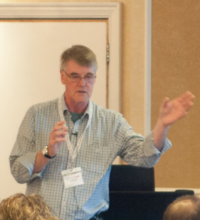
English language teaching is the one area of UK education where assessment hasn't yet taken hold, partly because of the demands of continuous enrolment, says Vic Richardson.
But it doesn't have to be that way, says the author and teacher. He will explain how in his opening plenary at the English UK Academic Conference in London this Saturday.
Mr Richardson said: "If an inspector comes in and asks for evidence of student progress, we can't do that. Nobody even asks, and that's pretty awful." He added: "ELT is behind the curve on this. Primary and secondary schools are all doing assessment for learning, and involving students in that."
Find out how to make assessment work in your centre at the Academic Conference
Vic will explain how assessment can work in the ELT classroom to improve teaching and learning. His trick is to use self and peer assessment techniques.
"We developed a technique of testing students when they arrive, projecting how much progress they would make by the time they left and setting targets along the way."
The students would measure their progress and that of their peers in speaking, utilising "ipsative assessment" – competing with themselves rather than norm or criterion assessment, and using a personalised framework for study.
He says: "I'd really like to start something on this, and find a way for people to work together on this in the future."
Interested? Book places for you and your staff before midday this Thursday
 |
Transforming assessments with Vic Richardson
Continuous enrolment has been with us for years and it is here to stay. It is a commercial imperative but it is also a pedagogic nightmare that we have yet to really address.
In his plenary he offers us a new paradigm, one in which we can meaningfully and measurably track students' progress on continuous enrolment courses by using learning technology to individualise it, and, drawing on assessment for learning activities and strategies, he hopes to offer us insights into how we can noticeably improve their progress.
|
previous entry << >> next entry